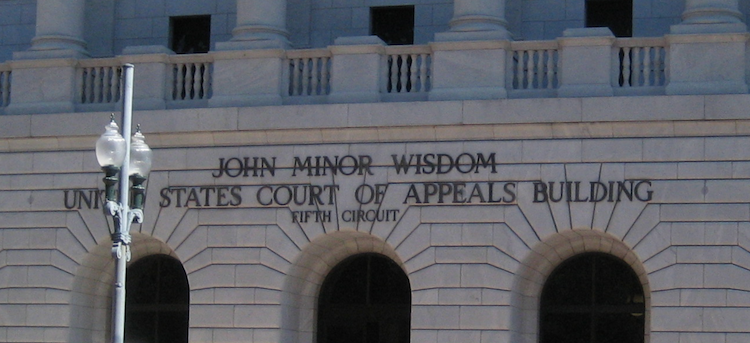Mandatory bar in Texas violates lawyers' First Amendment rights, 5th Circuit rules

Photo by Infrogmation via Wikimedia Commons.
A federal appeals court ruled Friday that the mandatory state bar in Texas violates lawyers’ First Amendment rights because of its political and ideological activities.
The 5th U.S. Circuit Court of Appeals at Louisiana ruled for three lawyers who filed the challenge, holding that their First Amendment rights were violated because most of the bar’s legislative lobbying was not relevant to regulation of the legal profession or improving the quality of legal services.
Law360, Bloomberg Law and Courthouse News Service have coverage, while How Appealing links to the July 2 decision.
The appeals court said the plaintiffs can’t be compelled to be members of the State Bar of Texas pending resolution of the lawsuit’s remedies phase.
“The bar is engaged in nongermane activities, so compelling the plaintiffs to join it violates their First Amendment rights,” the 5th Circuit said.
The State Bar of Texas has several “constitutional options,” the 5th Circuit said. “The bar can cease engaging in nongermane activities; Texas can directly regulate the legal profession and create a voluntary bar association, like New York’s; or Texas can adopt a hybrid system, like California’s. But it may not continue mandating membership in the bar as currently structured or engaging in its current activities.”
Also on Friday, the 5th Circuit reinstated a separate lawsuit challenging the mandatory bar in Louisiana. The lawyer who filed suit, Randy Boudreaux, had standing to challenge the bar’s procedure for contesting nongermane expeditures, the appeals court said.
Jacob Huebert, the lawyer who represented Boudreaux, told Law360 that the 5th Circuit decision in the Texas case is the first decision by a federal appeals court striking down mandatory bar membership and dues.
Thirty-one states and Washington, D.C., have mandatory bars, according to the 5th Circuit.
Judge Jerry Smith wrote the Texas opinion, joined by Judges Stuart Kyle Duncan and Don Willett. Willett wrote the Louisiana opinion, joined by Smith and Duncan.
The Texas case was filed by lawyers Tony McDonald, Joshua Hammer and Mark Pulliam, who claimed that the bar’s expenditures on political and ideological activities violate their First Amendment rights, and bar procedures to object to those procedures are inadequate.
Members of the Texas bar who object to a specific, proposed expenditure can file an objection to obtain a pro rata refund of their membership fee. The bar’s executive director has the authority to rule on the objection, after consultation with the bar president. Only one member of the bar has used the procedure since its adoption in 2005.
The procedure “is constitutionally inadequate,” the 5th Circuit said. The bar doesn’t provide meaningful notice of how dues will be spent. The budget only details expenses at the line-item level, often without adequate explanation.
Objecting lawyers have to register complaints with committees or sections drafting proposals or to lodge a complaint at the annual hearing on the proposed budget. In addition, the executive director has sole discretion to decide whether a refund is available, leaving losing lawyers “out of luck,” the appeals court said.
The court said the bar couldn’t spend mandatory dues on lobbying activities that aren’t germane to lawyer regulation or improving the quality of legal services.
In 2019, the State Bar of Texas lobbied for 47 bills on subjects ranging from LGBTQ rights to trusts and estates.
“Many of the bills the bar supported relate to substantive Texas law and are wholly disconnected from the Texas court system or the law governing lawyers’ activities,” the 5th Circuit said.
As an example of “obviously nongermane” activity, the appeals court pointed to the bar’s lobbying to amend the Texas Constitution’s definition of marriage and creating civil unions. Lobbying on a trusts and estates bill was germane to the extent that the bill affects lawyers’ duties when serving as trustees and nongermane with regard to other provisions, the court said. Another nongermane activity is lobbying for changes to Texas substantive law designed to benefit low-income Texans, even though the bar said the bills would increase access to justice.
But the appeals court said several activities were germane to lawyer regulation, including its work to improve diversity in the legal profession, offer continuing legal education, aid pro bono work, publish the Texas Bar Journal and host an annual convention.
The appeals court examined two relevant U.S. Supreme Court decisions and described their holdings. The first, the 1961 decision Lathrop v. Donohue, held that lawyers can be compelled to join a state bar association that solely regulates the legal profession and includes the quality of legal services.
The second, the 1990 decision Keller v. State Bar of California, held that bars couldn’t use mandatory dues to fund activities of an ideological nature that aren’t related to regulating the legal profession and improving the quality of legal services.
Keller indicated that some opt-out procedures could satisfy the First Amendment. But it did not resolve whether lawyers can be constitutionally mandated to join a bar association that engages in nongermane activities, the appeals courts aid.
Trey Apffel, executive director of the State Bar of Texas, gave a statement to Law360.
“We continue to believe the state bar’s legislative program and all of its access to justice initiatives are germane to regulating the legal profession and improving the quality of legal services, and respectfully disagree with the panel’s contrary conclusion,” Apffel said. “We are assessing the bar’s next steps in light of the panel’s opinion.”
The Texas case is McDonald v. Longley. The Louisiana case is Boudreaux v. Louisiana State Bar Association.
Write a letter to the editor, share a story tip or update, or report an error.


